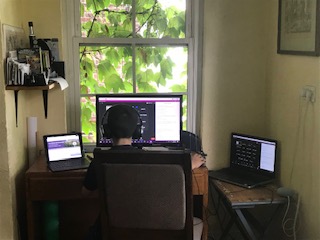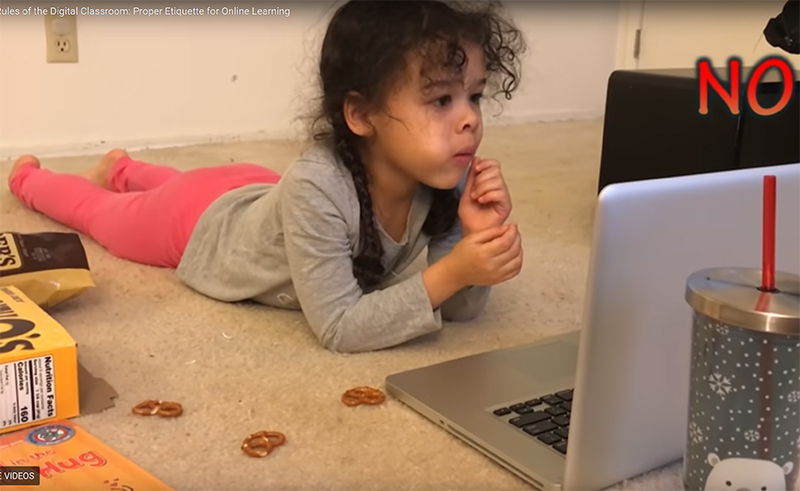I rarely I find a New York Times analysis that echoes something I wrote. On October 1, 2020, Carina Chocano did just that in a piece on “Distance learning, with shades of big brother.” This was triggered by a wonderful awful video on what little girls should NOT do when Zooming school.
As Chocano points out, this video is nor really addressed to 5 year old girls, but rather to her parents.
Why would such a video be necessary? Why does it make so much sense for school people to tell parents to watch it?
A long time ago (1984), McDermott and I wrote about a well known chore of 20th century modernity: “homework” that is school work to be performed at home. As children continue to do all their school work at home anthropologists should wonder anew about the relationship between home and school. In 1984, we argued that family education looks nothing like school education. In general, the organization of family education will always evolve through mechanisms that centralizing authorities cannot fully direct—even as they attempt to do so. Simply put, school teachers are licensed by the State, family teachers are not. School teachers are disciplined by assistant principals or “inspectors” (as they are called in France) to check whether they enforce the currently approved curriculum or pedagogy. Parents, in contrast, cannot be routinely disciplined-thus perhaps the need for a video on how to do school at home.
Our main goal in the 1984 paper was to highlight the reality of family education and particularly the paradox that this education shapes the actual performance of “homework” and easily trumps what the School attempts to do. We were also trying to investigate an alternate, ethnographic and ethnomethodological, route to the analysis of the great school mystery: why is it that an institution designed to mitigate birth privilege as been such at failure at doing so. Since the late 1960s at least, “big data” social scientists have established that the most powerful predictor of school success is family organization (Coleman 1966: 218ff). Half a century later, not much has changed. How can that be?
The most common answer is the one Chocano learned in college. As she tells us, while watching the video she was reminded of prisons and “big brother.” She then goes on to quote Michel Foucault about disciplining the body of children-as-pupil to make “docile bodies” who “internalize” the discipline into adulthood and parenthood when they will reproduce it. She might also have quoted Bourdieu on the production of an “habitus” without noticing that reproduction through internalization is an altogether wild hypothesis. This is not Chocano’s fault. She was probably not taught that Foucault had radically discounted all evidence that the (let’s say French) State (of, say, the first half of the 20th century), however centralized and hegemonic over its provinces essentially failed in its task. The French State did discipline speakers of Provencal into speakers of French (as happened to my grandparents) and it did punish those who refused to send their children to school. But this State, like all other states, failed to so discipline families in their internal organization. The State and its wardens (to develop what Foucault does not quite tell us is a metaphor) could not prevent families from appearing to satisfy wardens and inmates that they should not punished while they actually escaped the fate the institution prepared for them.
Readers of Foucault and Bourdieu should now focus on this failure of the School to control families. McDermott and I, as cultural anthropologists have done since Boas at least, were trying to do by documenting the multiplicities of alternate ways families found to do what their schools was trying to discipline them to do. In the language of the video, they did eat while doing homework, they danced when they should have been sober, and they doodled in the margins of their workbooks (like the little girl does when she fills a comment box with unicorn emojis!).
What I would now say McDermott and I were also doing was bringing out the way school work at home threatens internal familial dynamics and thus requires specific family work to encompass what the School requires. Transporting school into home makes a crisis that those who make this home must then deal with. By proceeding in this fashion, from crisis to observation of the work of re-ordering, we were doing what anthropologists have always done and was made by Garfinkel into a fundamental methodological tool: we use disruption in the habitual to get a better sense of that particular order some human beings try to live by. They rarely did. But we are now living just such a crisis and it can tell us much about many of our institutions including, of course, all institutions in their educational roles.
As I argued earlier, C19 does not close schools, only some people can do this and, in the process, produce the local orders I label “Corona.” But, as it is daily made evident, Corona, anywhere that it is getting institutionalized, is made up of different practices depending on whether one is acting as an agent of the School (say a person-as-teacher Zooming) or whether one is doing so as an agent of one’s family (say this teacher-as-parent setting up a child’s Zoom). Interestingly, the production channels are more complex as State agencies are themselves organized so that the part of the State dedicated to public health can impose matters on that other aspect of the State designed to shape schools and maintain this shape. By enforcing the injunction “Stay Home! Stay Safe!” public health official created a crisis for school governors who had little choice but to transport school into family. And, as these governors knew well, by doing this they were also relinquishing much of their disciplinary methods … thus the production of a video that is clear evidence that these governors know very well that children-as-children will do all the things marked as “NO!” on the video (and much else that would not be shown on a “family-friendly” video). And they know that their parents may let them do these NO things. Parents may organize their child so that he could, should he decides to do it on his own, explore the Siberian Socialist Republic one one monitor while School Zoom drones on the others.

That parents may organize their children do what the school say they should not do may or may not be a problem. As an anthropologist, I always err in the direction of celebrating the human capacity to find ways through crisis no other human being can imagine. One might even say transporting school into home is a step towards “deschooling” society (Illich 1970). And yet, as a child of three centuries of “democratic” revolutions I also understand the concern about the reproduction of birth privilege through family processes that trump school processes. Access to three monitors and a desk of one’s own is not something many parents can do. C19 is also an occasion and justification to radically distance one’s children from all sort of undesirables to the parents—they might carry diseases! There was a good policy reason for “public” schools that radically separated children from their parents and local communities. Whether the aftermath of Corona will lead to a return to this kind of schooling that was already on the way out is something an anthropologist cannot say.
References
Coleman, James 1966 Equality of educational opportunity. Washington: U.S. Government Printing Office.
Foucault, Michel [1975] 1978 Discipline and punish. Tr. by A. Sheridan. New York: Penguin Books.
Illich, Ivan 1970 Deschooling society. New York: Harper & Row.
McDermott, R.P., S. Goldman and H. Varenne 1994 “When School Goes Home: Some Problems and Defensive Tactics,” Teachers College Record. 85: 391-409.

